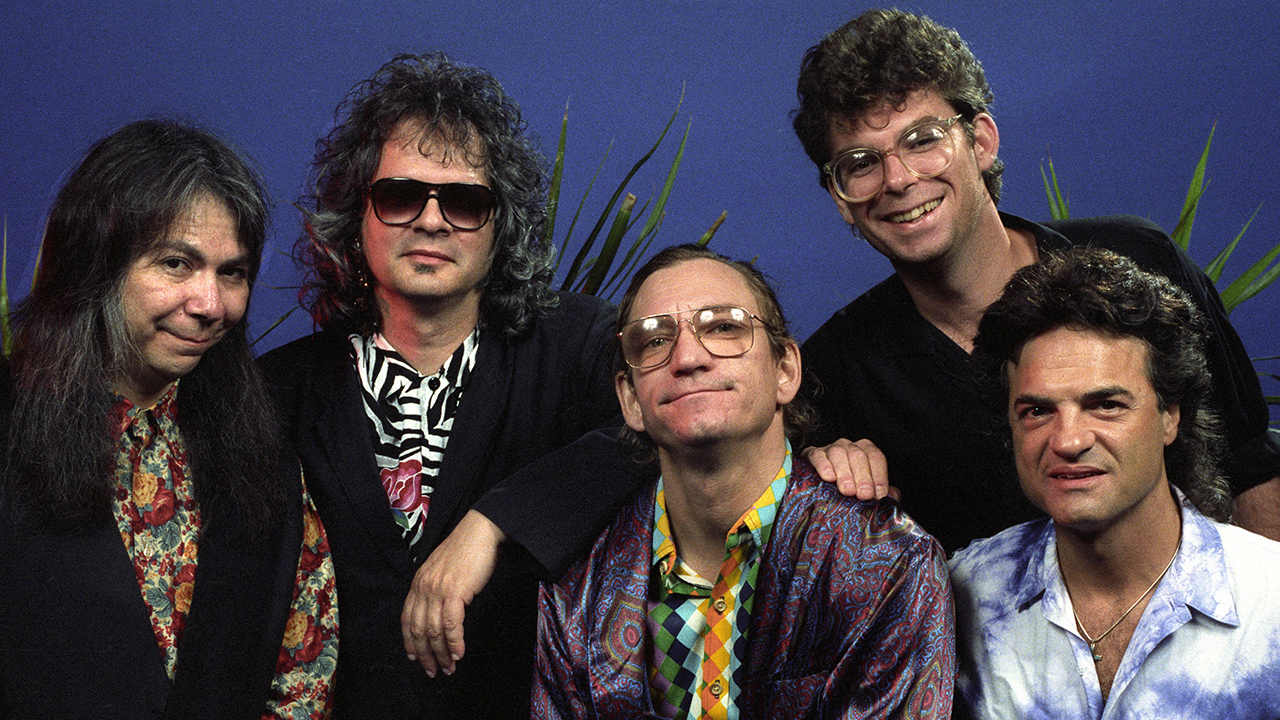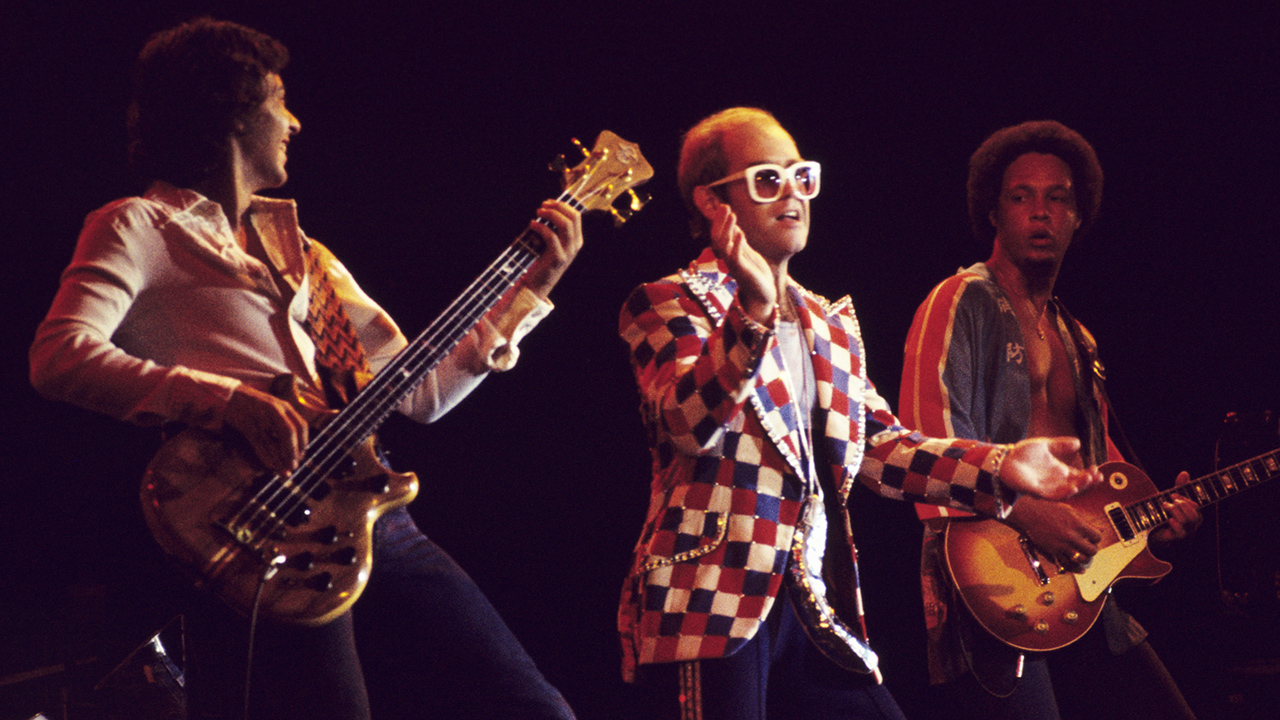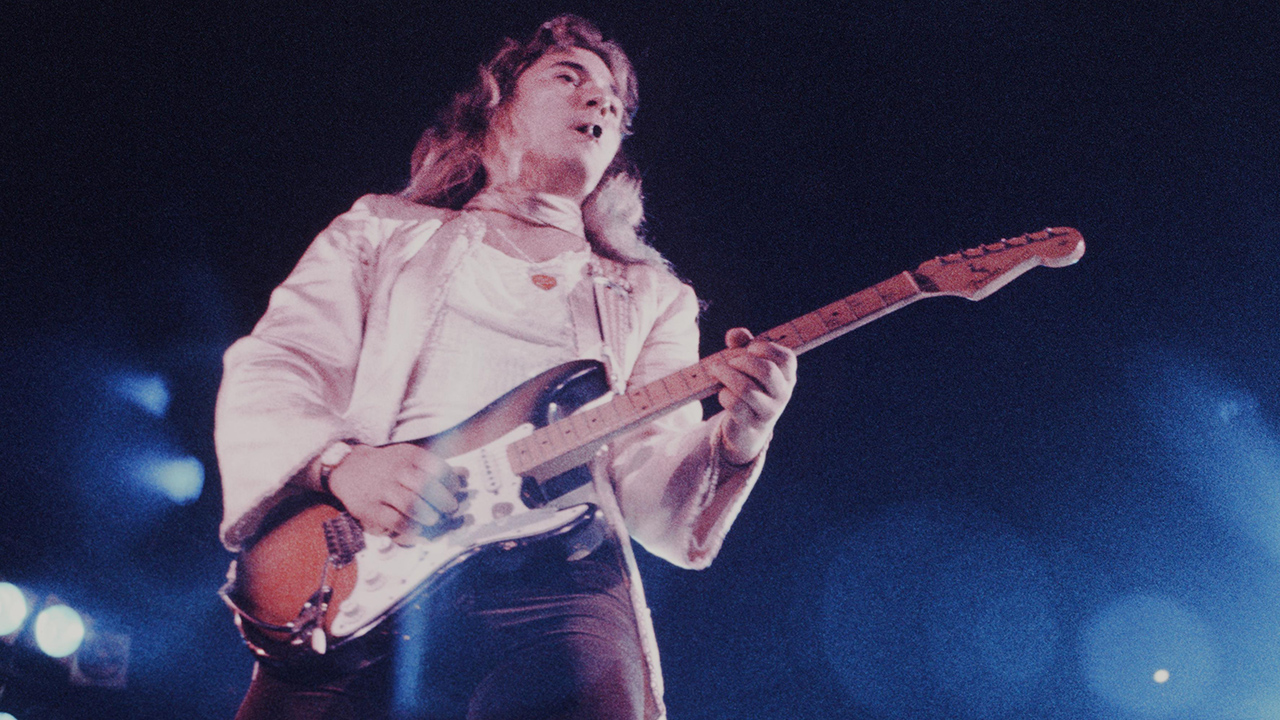“Tommy Bolin said, ‘Joe Walsh quit the James Gang. He wants to start a new band, and I told him you’re the guy’”: Kenny Passarelli has played with rock royalty, but it’s his recordings with Bolin that would “blow you away” – if he could let you hear them
He’s been lucky enough to get a gig with Elton John with no audition, and unlucky enough to miss a gig with Foreigner after killing an audition… the Joe Walsh and Hall & Oates bassist has had a truly remarkable session career

One look at Kenny Passarelli's discography – which includes stops with Joe Walsh, Elton John, Dan Fogelberg, Stephen Stills and Hall & Oates – will tell you all you need to know: he was born to hold down the low-end.
“It all started with the bass guitar,” Passarelli tells Bass Player. “Once I understood it, be it traditional or fretless, I was hooked. But the funny thing is I was a classic trumpet player as a kid and was heading toward Julliard before I got bored. I had the chops, but that life never would have worked for me socially.”
Rock music did work for him, though, leading to his membership of Walsh’s band Barnstorm. “I never would have gotten the gig with Joe had it not been for Tommy Bolin,” Passarelli reveals. “We were good friends, and while we never got to do something together formally, he turned me on to the fact that Joe needed a bassist. The rest, as they say, is history.”
Walsh aside, Passarelli weaved his way into rock’s ‘70s tapestry, ending up on classic records such as Dan Foelberg's Souvenirs (1974), Stephen Stills’ Stills (1975), Elton John’s Rock of the Westies (1975) and Blue Moves (1976). As the ‘80s dawned, he stayed busy, holding down the rhythm for Hall & Oates.
Things tapered off later, though he did appear on Yusef ‘Cat Stevens’ Islam’s Roadsinger (2009) and Walsh’s Analog Man (2012). These days, while not actively recording, he’s got an off-Broadway play in the works, featuring the hits he lent a hand in recording.
What initially drew you to the bass guitar?
“It was the mid-’60s British Invasion. I had some high school buddies who were into guitar, and they had a drum set too. I’d go there to hang out, play guitar and even play drums.
Get The Pick Newsletter
All the latest guitar news, interviews, lessons, reviews, deals and more, direct to your inbox!
“But nobody wanted to play bass, and I’d taught myself to play a bit on my parents’ four-string Spanish guitar by listening to The Animals, so that’s what started it.”
Can you recall your first real bass guitar?
“My first real bass was one of those Fender six-string basses [the Bass VI]. It differed from regular Fender basses because it was like an octave below.
“But my first four-string bass was one I borrowed, and that would have been some sort of Gibson, which I liked because all the British guys played them. Later, I became known for using a Fender P-Bass, but that didn’t happen until the ‘70s.”

From there, how did you hook up with Joe Walsh in Barnstorm?
“I had quit college and I was in a music store in Denver, Colorado, and there Tommy Bolin was. We became friends, and later I was doing some session work in Vancouver, British Columbia, and Tommy was working up there too.
“He said, ‘Hey, I’d like to do something together, but I’m too busy.’ Then he said, ‘There’s this guy named Joe Walsh who moved to Colorado with his wife, and he just quit the James Gang. He wants to start a new band, and I told him you’re the guy.’”
And what were your impressions of Joe?
“I flew back to Denver, borrowed my dad’s car, went up the mountains and met Joe. There was about two feet of snow, but we got there, went down to Joe’s basement, and he played me a few tracks in his makeshift, 24-track studio. I heard that, took the gig, and that was it. It was all thanks to that call from Tommy Bolin.”
How close did you come to doing something with Tommy?
“Tommy was a couple of years younger – he was a runaway when I met him in ’68. We were both young but became good friends. We went to New York together to be jazz musicians, and we got in front of Tony Williams before he formed the Lifetime band. We had a shot, but there was a lot of heroin, and I’m too much of a capitalist – if there was no money in it, I didn’t wanna do it.”
You started using your trademark Fender P-Bass while with Joe.
“When I went to play with Joe, I had recently purchased a ‘50s P-Bass with a mahogany neck. It was so retro and I fucking loved it! I got it when I thought I might be a jazz player, but it was perfect for Joe.
“But something happened with Joe that changed my career: he turned me on to this prototype with a maple neck and no stripes, just dots. It was a white Fender P-Bass, and it was fretless. So, a big part of the Barnstorm sound was that fretless bass, which Joe got me into. It changed everything, man.”
Is it true you co-wrote Rocky Mountain Way with Joe?
“Yes. But the guys in the band were pissed by that point because Joe had initially said Barnstorm was to be a band, not a solo thing. We were starting a band, but Joe was already signed to ABC because of the James Gang, and so it was implied that it was a Joe Walsh thing, when really it was a band.
“The songwriting was often done as a band, which was very important. And Joe was always very supportive of that with me – he said, ‘Write songs not just for the band, but because it will generate your future income.’ I appreciated that, and despite some of the issues with guys being upset, I always loved working with Joe.”

What led to the end of Barnstorm?
“It was a bummer, but things changed once the money came in. We did an extensive tour with Dan Fogelberg, and only Joe and I did the Fogelberg record after that, so the writing was on the wall for the band. And after those sessions, on the plane back to L.A., Joe told me, ‘I’m leaving my wife, and I’m breaking up the band, and I’m moving to L.A.’”
Is that how you ended up with Elton John?
“The thing with Elton was incredible – and there was no audition. He’d heard all my work, which was good because I was licking my wounds at the time, thinking, ‘Man, what the fuck do I do now?’
“Around this time, Elton fired his band and I was recommended to him. Elton’s management called me and flew me to Paris, and when we got off, we were off and running.
“It was a whirlwind because I didn’t know these people and I wasn’t a big fan. By that point I was an American rock guy, and Elton’s stuff was way different. But I had a blast. I couldn’t believe it – I had just gotten off the plane and was told, ‘You got the gig.’ We started rehearsing and recording, which led to some amazing things.”
Through all of this, did you maintain contact with Tommy Bolin?
“Honestly, no. This is sad, man. Tommy was like my brother, and we were so close, but I barely saw him after I joined Barnstorm, save for running into him on the road.
“He joined the James Gang, and we didn't see each other for a long time. And then he joined Deep Purple, and I finally saw him while I was with Elton in late ’76, and he looked so fucked up.
“Tommy was like a different guy by then. He was deeply in trouble, and he seemed so lost. Not long after, I got a call from Tommy’s manager, asking me to go to Japan with him. But I said, ‘No, I can’t do it.’
“He was too fucked up; and not long after, he overdosed and died. But I’ve got tapes of me and Tommy that would blow you away. It’s us with a drummer; we would have been a hell of a power trio.”

Would you consider releasing those tapes?
“The truth is I only have one copy on CD, man. Tommy’s family has the rights to the publishing so it’s up to them and his management. All this stuff is spread out everywhere, and it’s sad.
“Tommy was so amazing, but sadly, he got fucked in lots of different ways because he wasn’t paying attention. A lot of people don’ t know – and Tommy told me this – that he was basically illiterate, so he was prone to being fucked over.”
What are your lasting memories of Tommy?
“He was just like Hendrix, man. You’d go to his house, and no matter the time of day or what he was doing, the guy had a guitar strapped on. One minute he’d be learning John Coltrane; the next, he was rocking.
“He was very special, innocent, and had no idea what people were doing to him. And once he got with Deep Purple, it was all over. They were heavy party guys, as was his last girlfriend, and he made a lot of mistakes with them.”
How did you become involved with Hall & Oates in the early ‘80s?
“I got a call from a friend, saying, ‘Hey, John Oates says you are playing at Madison Square Garden – he loves your playing.’ This was when Rich Girl was climbing the charts, and they needed a bass player to go on tour. But I had never seen those guys.
“I was convinced to go on tour with them; the deal was I’d be musical director and get a band together that was worthwhile. I said, ‘I’m not playing with these kids making $200 a week. They’re not good enough.’”
Why did things fall apart with Hall & Oates?
“I had done well financially for my age. I had a house in Boulder, Colorado, and I had an expensive apartment in New York City. But after things fell apart with Hall & Oates, I was out of a gig. Hall & Oates couldn’t pay for my retainer because they were broke.
“I remember seeing them walking out of their accountant’s office crying, after they found out all their money was spent by the people who were supposed to be helping them.”
A friend told me Foreigner was auditioning bassists… Man, I killed it. I was sure I got that gig. You have to ask Mick Jones what happened
I read somewhere that you auditioned for Foreigner in the ‘80s. Is that true?
“It is true. A friend told me Foreigner was auditioning bassists and said, ‘Hey Kenny, you’d be perfect!’ I agreed, so I got a hold of Mick Jones, and he asked me to come down and rehearse.
“Man, I killed it. I was sure I got that gig. You have to ask Mick what happened, but I was told management got involved, and things fell apart business-wise. And then, I was going to still be working with Daryl Hall, but he was pissed, and that was never the same. So that was it.”
In 2012, you worked with Joe again on his record Analog Man. Were there any talks of continuing onward together?
“We talked about it. It took a while, but Joe got in touch, saying, ‘I want to go back into the studio with the Barnstorm guys.’ We ended up meeting up in Joshua Tree, California, a few years ago. But nothing came of it – it wasn’t there.
“We hung out in the house together for around 11 days, but it didn’t work. The magic was gone. But I’m still in touch with Joe, and we’ll see what happens.”
Andrew Daly is an iced-coffee-addicted, oddball Telecaster-playing, alfredo pasta-loving journalist from Long Island, NY, who, in addition to being a contributing writer for Guitar World, scribes for Bass Player, Guitar Player, Guitarist, and MusicRadar. Andrew has interviewed favorites like Ace Frehley, Johnny Marr, Vito Bratta, Bruce Kulick, Joe Perry, Brad Whitford, Tom Morello, Rich Robinson, and Paul Stanley, while his all-time favorite (rhythm player), Keith Richards, continues to elude him.
“I asked him to get me four bass strings because I only had a $29 guitar from Sears”: Bootsy Collins is one of the all-time bass greats, but he started out on guitar. Here’s the sole reason why he switched
“I got that bass for $50 off this coke dealer. I don’t know what Jaco did to it, but he totally messed up the insides!” How Cro-Mags’ Harley Flanagan went from buying a Jaco Pastorius bass on the street to fronting one of hardcore’s most influential bands


![John Mayer and Bob Weir [left] of Dead & Company photographed against a grey background. Mayer wears a blue overshirt and has his signature Silver Sky on his shoulder. Weir wears grey and a bolo tie.](https://cdn.mos.cms.futurecdn.net/C6niSAybzVCHoYcpJ8ZZgE.jpg)

![A black-and-white action shot of Sergeant Thunderhoof perform live: [from left] Mark Sayer, Dan Flitcroft, Jim Camp and Josh Gallop](https://cdn.mos.cms.futurecdn.net/am3UhJbsxAE239XRRZ8zC8.jpg)






